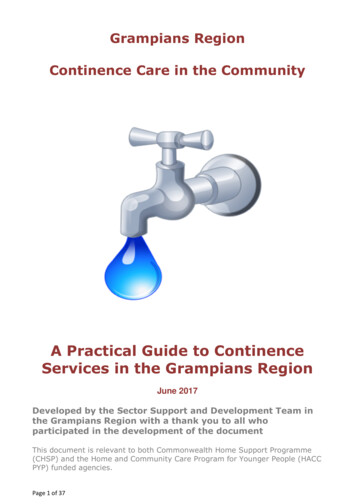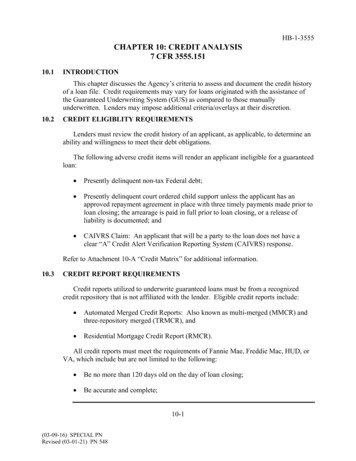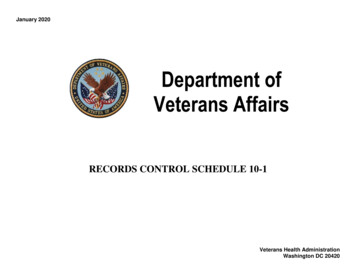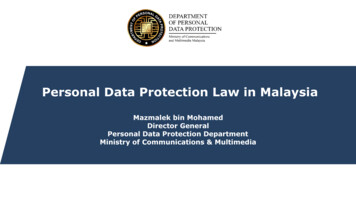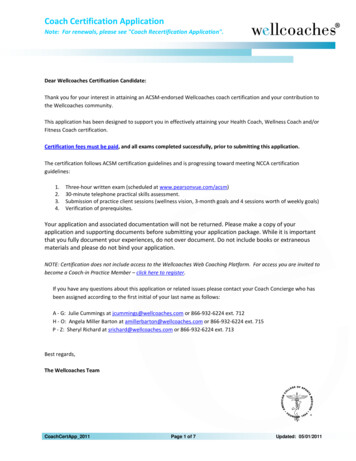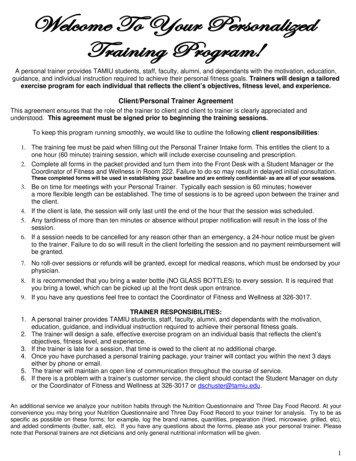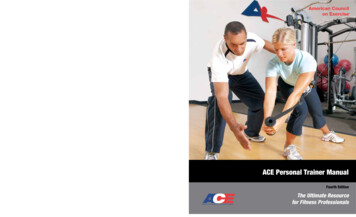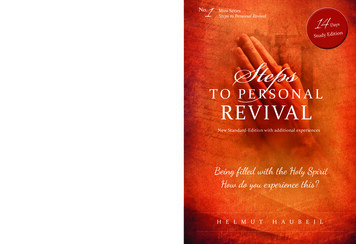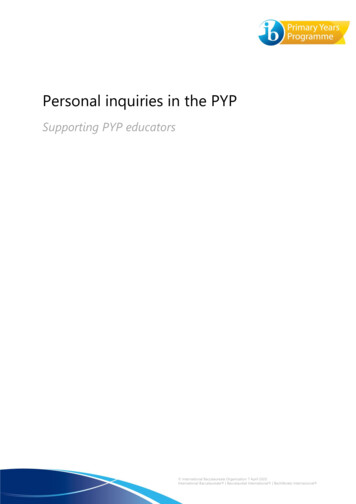
Transcription
Personal inquiries in the PYPSupporting PYP educators International Baccalaureate Organization 7 April 2020International Baccalaureate Baccalauréat International Bachillerato Internacional
Introduction to personal inquiries in the PYPWhyIn a remote learning environment, personal inquiries can provide an opportunity formiddle to upper primary students to focus on their own interests and be motivated todrive their own learning. Personal inquiries seek to actively ignite passion, inspirerelevance and develop agency in students.They also enable the integration of home and family languages, languages of the school, aswell as additional languages. Personal inquiries engage students in a deep, authenticlearning experience that builds academic skills, fosters reflection, andcan inspire action.WhatAgency, IBO, PYP 2018.Transdisciplinary learningPersonal inquiries allow for the continuous integration andconnection of prior and new knowledge and experiences in ameaningful way to broaden students’ understanding about the world around them. Theygo across, between and beyond subjects, and emphasize integrated learning. Theacquisition of literacy and numeracy skills, in their broadest sense, is essential as theseskills provide students with the tools to inquire more effectively. It is helpful for teachersand families to support students making connections and exploring the relationshipbetween the subject areas.Independent, yet collaborativeA personal inquiry usually requires a student to work independently, however, the processcan still be collaborative to support student success. Students can be connected to othersin meaningful ways that support their inquiries. Students might be partnered with a peer International Baccalaureate Organization 26 March 2020
or family member that they can check in with daily or regularly in order to sharechallenges, successes, ideas, set goals and help create accountability.A teacher can deepen the inquiry experience for the students in a variety of ways: askingquestions; listening to their thinking;redirecting when necessary; givingfeedback. Teachers can have regularlyestablished check-ins with students tohelp ensure a successful learningjourney.Role of the student:Students can be responsible for: planning and organizinglearning driving the inquiry process through their questions documenting learning learning reflections self and peer assessments action.Students take responsibility for planning their inquiries and conferring with their teachersif they need to refine or change their ideas. They can reflect on their own learning andgive feedback to others, offering improvements. Finally, students can initiate collaborativeactions that reflect local, national and/or global significance.Role of the teacher:Teachers support the development of knowledge, skills, conceptual understandings, learnerprofile attributes and considerations for action by nurturing these authentic learningexperiences.To support agency, teachers might use multiple strategies, tools and resources whenconferring to: spark interest create tension through provocation set up collaborations provoke investigations and reflections give specific and ongoing feedback on skills and understanding co-construct goals and next steps create agreements around timelines and self-assessment redirect learning as appropriate. International Baccalaureate Organization 26 March 2020
Role of the family:Family members are encouraged to contribute their expertise and feedback wherepossible. They can support their child to: explore ideas listen and question for clarification and deeper understanding prioritize goals establish timelines browse and suggest suitable resources designate check-in times to see how learning is progressing and discuss next steps share their inquiries with extended families or friends celebrate learning and daily achievements.For families with multiple children, a family inquiry, rather than multiple personal inquiriescould be planned and carried out. Members involved with this inquiry couldcollaboratively agree upon an area of interest.HowThere are many approaches to designing, planning, conducting and sharing personalinquiries. These will vary depending on factors such as age, learning needs, logistics,context.The personal inquiry planners are designed to guide the inquiry process. Please feel freeto adjust them as needed. They are aligned with the core elements of the PYP and can beflexibly used by students.The planners are available to download in PDF and Word formats from our dedicatedresource page: -during-the-covid-19-coronavirus-pandemic/ International Baccalaureate Organization 26 March 2020
Suggested approaches TIMING:Depending on schedules, a personal inquiry can run for 3-6 weeks or more. Whenpossible, it is helpful for students to have adequate time to: International Baccalaureate Organization 26 March 2020
Create & sharelearningPlan &investigateOngoingreflectionExplore ideas& choose afocusTIMINGEvaluate process& learningDesign Copyright Showeet.comLearning how to learn:While the students may be deeply engaged in the content, instruction might be requiredaround skills and processes needed for effective inquiries. These could include: asking questions (e.g. open vs closed, factual, conceptual, debatable) sourcing information critically analysing sources for reliability and accuracy notetaking organizing data or research notes interviewing taking photos writing emails and thank you letters.Engaging students initially:There are many approaches to helping students choose a personal inquiry. Suggestions tofocus their passions and interests could include: creating a mind map or list of possible options and questions sharing passions/hobbies/interests/questions with others International Baccalaureate Organization 26 March 2020
interviewing family members and other relevant expertsexploring local and global issues around a transdisciplinary theme or conceptthrough images or videossharing what a central idea means to them and what interests/questions they havearound itestablishing a list of criteria.What have you alwayswanted to learn more about?Why is this importantto you?How would you provide ajustification for why this is /has been a good personalinquiry for you?Helping studentsWhat do you wonderabout?What might you dowith the informationyou learn?choosing an area to focusHow does this connect to thelocal / global world?Could this be important forothers to know?What are your interests,passions? How are theyconnected to the worldaround you?Design Copyright Showeet.comDocumenting learning and reflections through journals:Personal inquiry journals can be a wonderful way to document the learning process.Different sections of the planner can be expanded upon in a journal. It can be a place forstudents to document their investigations, interviews, surveys, new understandings, furtherquestions and findings.Journals can be created using various digital and non-digital tools including: different digital programmes to add images, audio, links etc to create presentationsin different forms mixed art mediums (e.g. folder, poster, portfolio).Inquiry journals can: International Baccalaureate Organization 26 March 2020
facilitate feedback between both teacher and student and student to student (thiscan be online or face to face)support analysis and evaluation of information collectedcreate reflection space for personal learning goals and achievements.Reflective prompts throughout the process can support students in considering theirlearning more deeply and in determining next steps. Some reflective prompts to usemight be: What did you learn today?What don’t you understand yet?What new questions do you have now?Have your ideas or thinking changed? Why?What different opinions/views are there on this subject? What’s your opinion andwhy?Can you explain your learning in different ways?How does your learning connect to the local/global world?What do you want to learn more about?What can you already do?What will you work on next?What can you do to become a more effective learner?What factors are important for helping you learn well?Have you considered ethical, cultural and environmental implications?What new learning would you want to share with or teach your peers? International Baccalaureate Organization 26 March 2020
Investigating:A variety of resources can be used throughout the investigation stage. Students may needadditional support to expand their ideas around potential resource options. Somequestions for students to consider might include: What specific knowledge and skills might be needed that I do not already have?What type of materials and resources will contribute to my inquiry?Where can I source these materials?Who might I learn from? How can I contact them?There are many resources students can access beyond digital tools for researching. Otherresources and tools that may also contribute to the depth of an inquiry include: design materials game pieces or other manipulatives, arts, science or kitchen supplies community members local and global experts.Sharing and celebrating the learning:Students need to consider how their inquiries will be shared, for what purpose and towhom. Considerations might include: Who is my audience?How might I engage my audience?What is the purpose of sharing my learning?What is the most important information to share?How will I share my information?How might I make my presentation come alive?There are many possibilities to make the learning process visible. Students are encouragedto think creatively and consider a variety of tools to best help them express themselves.Some ideas for sharing personal inquiries include: journals or E-Books created by students, with the opportunity to articulate andpresent their learning processes and progress learning products (e.g. songs, poems, dramatic performances, visual art forms,business plans, oral history videos, reports, curations, mixed media presentations,documenting experiences and actions, debates, web pages, videos, technicaldrawings, flow charts, experiments, etc). International Baccalaureate Organization 26 March 2020
If permitted by your school and to get an international audience, please sharepersonal inquiries on your social media platforms using the hashtag #pipyp. Youcould also notify us through @ibpyp. We would love to hear about what you aredoing.Action:Personal inquiries provide the local and potentially global contexts that can encouragestudents to take responsible action in a meaningful, mindful and responsive way. Studentsplanning and carrying out personal inquiries may need support in initiating action.Different circumstances such as available resources, different forms of collaboration andinteractions might need to be considered.Action can be personal or collective. Here are some examples: a change in attitude a consideration or plan for action in the future a demonstration of responsibility, or of respect for self, others and the environment a commitment to supporting a local community group or volunteering an engagement in family, community, or local decision makingTeachers can support student action by: engaging students in dialogue around what action is encouraging students to consider the appropriateness and impact of their actions guiding students to reflect on their actions and adjust their course of action whennecessary.Assessment:As part of PYP assessment practices, students take an active role in their assessment. Theylearn to self-assess and discuss their progress towards achieving learning goals.Tools such as the ones below could be used by students to reflect on their learning andaction on an ongoing basis. When conferring with students and analysing their work thesecan be used to help students set learning goals and determine next steps. They aredesigned to be modified according to context, age and learning needs. International Baccalaureate Organization 26 March 2020
Reflection statements connecting to Action and the Learner profileStatementLearner profileattributesStatementI know myself welland see myself asbelonging to localand globalcommunities.ReflectiveI demonstratemotivation,willingness andcommitment in takingaction for positivechange.Learner profileattributesStatementCaring, principledI am curious andreflective and act withintegrity and honesty.Learner profileattributesPrincipled inquirerStatementI can reflect on actionand modify courses ofaction whennecessary.Learner profileattributesReflectiveSources: The exhibition, IBO, PYP (2018) International Baccalaureate Organization 26 March 2020I am actively part ofcommunities: myfamily, my home,my learningcommunity andbeyond.I am developing anddemonstratingattributes of the learnerprofile that support mein becominginternationally-minded.I am confident in myability to participateand contribute topositive change.CaringBalanced,open-mindedReflective risk-takerI can recognize andunderstand theinterconnectionsandinterdependence ofopportunities andchallenges of local,global significanceand use critical andcreative thinking toaddress them.KnowledgeablethinkerI make informedand ethicaldecisions.Principled thinkerI can consider theappropriatenessand impact ofaction taken andreflect onpossibilities toimprove presentand future action.Reflective thinkerI can connect localaction to global actionand vice versa.ThinkerI can confidently andcreatively plan, carryout and reflect onaction.CommunicatorI take responsibleaction for a morepeaceful andsustainable world.Reflective, balanced andcaringI can challengeassumptions and seethings from multipleperspectives.Open-mindedthinker and risk-takerI engage inmeaningfulexperiences withpeers, teachers andthe learningcommunity that leadto action for positivechange.BalancedI see myself as acompetent andcapable agent ofchange.Reflective
Reflection on Approaches to LearningApproaches to LearningWhen I amworking on mypersonal inquiry,I really enjoy.My Thinking Skills-Critical thinking (analysing;evaluating; formingdecisions)-Creative thinking (considernew perspective, designimprovements to products,processes etc.)-Transfer learning (use skillsand knowledge in multiplecontexts; make connectionsbetween subjects andinquiries; transferunderstanding to createsolutions, actions orproducts)-Reflection (use thinkingskills to reflect on the processof learning; identify yourstrengths and areas forimprovement)My Research Skills-Planning my investigations-Gathering information andrecording data (conductingsurveys; interviewing; readinga range of resources;studying diagrams)-Understanding data-Use a range of media tocompare, contrast and drawconnections amongresources; seek a range ofperspectives from varioussources-Determine reliable sourcesand using media ethically tocommunicate; share andconnect with others International Baccalaureate Organization 26 March 2020When I amworking on mypersonal inquiry,I notice that Ifind it easy to.when. (giveexample)When I am workingon my personalinquiry, I notice thatI find it challengingto. when. (giveexample)I can helpmyself withthischallengeby
My Communication Skills-Exchanging information(listening; interpreting;speaking)-Literacy (reading; writing;using language tocommunicate and gatherinformation)-Communicating usingtechnology to gather,investigate and shareinformationMy Self-Management Skills-Organization (managingtime and tasks effectively;setting realistic andchallenging goals;documenting learning usinga logical system; completingtasks on time)-States of mind (usingmindfulness strategies toovercome distractions; beingaware of body-mindconnections; persevering,managing emotions; beingresilient to manage setbacksand work throughdisappointment; challengeand change)My Social Skills-Relationships (respectingothers; listening closely toother perspectives; practicingcare and empathy for others;taking on a variety of grouproles; making equitabledecisions; helping otherssucceed)-Social-emotionalintelligence (being aware ofyour own and otheremotions; resolving conflict,being aware of your impacton a group)Sources: Approaches to Learning, IBO, PYP (2018); Murdoch, M. (2015) International Baccalaureate Organization 26 March 2020
Question prompts that could be used for reflectionCHANGE:How is transforming?What differences are there over time?In what ways does differ from place to place andover time?What can you say about how is changing?What could you change to make ?What can you infer about the change in ?What facts would you use to support how ischanging?CONNECTIONHow is. linked to other things?What connections exist between and.?How are alike and different?Why is . suitable for.?How would you apply what you learned todevelop.?How can this be used in everyday life?What can you conclude about how. is related to.?FORMWhat is like?How would you describe ?What are the components of ?What would you use to classify ?Can you elaborate on the reason is like it is?FUNCTIONHow does.work?What can. be used for?What is the purpose of.?What information does. give us?How do. and. work together?What do you notice about how. works?Can you formulate a theory for how. works?CAUSATIONWhy is as it is?What is the reason ?What would happen if ?Why do we need ?How is related to ?Can you predict the outcome if ?What can you conclude about why occurred?PERSPECTIVEWhat are the points of view?How is different than ?How does look if it’s ?What are the implications for.?What is your interpretation of ? Support yourrationale.What facts would you use to support yourperspective about ?How does knowledge of allow us tounderstand ?RESPONSIBILITYWhat are our obligations?How can the use of. influence.?What responsibility does. have to.?Who should decide.?How can people ensure.?What factors do we need to consider when making a decision?What can you conclude about what your responsibility is?Sources: Making the PYP happen, IBO, PYP (2009); Aungst (2014); Erickson, HL (2007) International Baccalaureate Organization 26 March 2020
Sample central ideas based on the learner profileHere you will find a variety of sample central ideas created around the learner profileattributes. They have been created in such a way that they may be used under multipletransdisciplinary themes with multiple key concepts. The sample lines of inquiry may lendthemselves to certain transdisciplinary themes more so than others. These are samples. Ifyou think your students would benefit from a more guided inquiry, you might use theseon the personal inquiry template. Feel free to adapt them to your own context and needs.Inquirers: We nurture our curiosity, developing skills for inquiry and research. We knowhow to learn independently and with others. We learn with enthusiasm and sustain ourlove of learning throughout life.CI: Through inquiry, we nurture curiosity and develop research skills and the ability to workindependently and with others.CI: Our curiosity helpsus learn.Sample possible transdisciplinary theme, key concepts and lines of inquiryTheme: How the world worksKey Concepts: Responsibility, function, causation, changeLines of Inquiry How humans respond to change Patterns found around us Evaluating, sorting and presenting data Using technology to innovateKnowledgeable: We develop and use conceptual understanding, exploring knowledgeacross a range of disciplines. We engage with issues and ideas that have local and globalsignificance.CI: We become knowledgeable by exploring locally and globally significant concepts, ideasand issues across a broad range of subjects.CI: We become knowledgeable by exploring big ideas in our local and global world.Sample possible transdisciplinary theme, key concepts and lines of inquiryTheme: Sharing the planetKey Concepts: Connection, Change, Responsibility, CausationLines of Inquiry Connections between local and global issues How living things respond to change Human impact on the environment Factors that influence choice International Baccalaureate Organization 26 March 2020
Thinkers: We use critical and creative thinking skills to analyse and take responsible actionon complex problems. We exercise initiative in making reasoned, ethical decisions.CI: Thinking critically and creatively and asking and exploring challenging questions helpsus understand complex problems and make reasoned, ethical decisions.CI: Asking questions and thinking creatively helps us understand problems and makedecisions.Sample possible transdisciplinary theme, key concepts and lines of inquiryTheme: How we express ourselvesKey Concepts: Function, Responsibility, PerspectiveLines of Inquiry Critical evaluation of different types of information How we interpret and respond to media Why viewpoints differCommunicators: We express ourselves confidently and creatively in more than onelanguage and in many ways. We collaborate effectively, listening carefully to theperspectives of other individuals.CI: We communicate in manyways to better understandeach other.Sample possible transdisciplinary theme, key concepts and lines of inquiryTheme: How we express ourselvesKey Concepts: Function, Perspective, ResponsibilityLines of Inquiry Discoveries made through different types of play Communication in play Our responsibilities in playCI: Play invites opportunities for communication and creative expression.Sample possible transdisciplinary theme, key concepts and lines of inquiryTheme: How we express ourselvesKey Concepts: Function, Causation, PerspectiveLines of Inquiry The diverse ways in which people communicate How images, text and music are used to influence behaviour The role of culture in artistic expression International Baccalaureate Organization 26 March 2020
Principled: We act with integrity and honesty, with a strong sense of fairness and justice,and with respect for the dignity and rights of people everywhere. We take responsibilityfor our actions and their consequences.CI: Respecting the dignity and rights of people everywhere requires integrity, honesty andtaking responsibility for our actions.CI: Inclusive communities help create independence and equitable opportunities for all.Sample possible transdisciplinary theme, key concepts and lines of inquiryTheme: Who we areKey Concepts: Causation, Perspective, ConnectionLines of Inquiry Interdependence within communities Factors that influence our choices and actions Similarities and differences between cultural groupsOpen-minded: We critically appreciate our own cultures and personal histories, as well asthe values and traditions of others. We seek and evaluate a range of points of view, andwe are willing to grow from the experience.CI: We understand each other better when we critically appreciate our own cultures andpersonal histories as well as the values and traditions of others.CI: Understanding each other’s cultures and traditions connects people to their familiesand communities.Sample possible transdisciplinary theme, key concepts and lines of inquiryTheme: Where we are in place and timeKey Concepts: Form, Perspective, CausationLines of Inquiry What constitutes culture How personal history informs our perspectives Why some values and traditions have changed or remained the same,over time International Baccalaureate Organization 26 March 2020
Caring: We show empathy, compassion and respect. We have a commitment to service,and we act to make a positive difference in the lives of others and in the world around us.CI: We make a positive difference in the world around us when we commit to service withempathy, compassion and respect.CI: Our caring actions make a positive difference in the lives of others and the worldaround us.Sample possible transdisciplinary theme, key concepts and lines of inquiryTheme: Sharing the planetKey Concepts: Function, Causation, ResponsibilityLines of Inquiry How local environments address people’s needs Equitable access to resources and opportunities Our responsibility for the well-being of othersRisk-takers: We approach uncertainty with forethought and determination; we workindependently and cooperatively to explore new ideas and innovative strategies. We areresourceful and resilient in the face of challenges and change.CI: We are resourceful and resilient in the face of challenges and change.CI: Change brings opportunities to be resourceful.Sample possible transdisciplinary theme, key concepts and lines of inquiryTheme: How the world worksKey Concepts: Change, Causation, ConnectionLines of Inquiry How living things respond to change How circumstances lead to the creation of important inventions How understanding phenomena helps inventors International Baccalaureate Organization 26 March 2020
Balanced: We understand the importance of balancing different aspects of our lives—intellectual, physical, and emotional—to achieve well-being for ourselves and others. Werecognize our interdependence with other people and with the world in which we live.CI: Our well-being is multifaceted and interdependent with other people and with theworld in which we live.CI: We foster well-being, for ourselves and others, by making balanced choices.Sample possible transdisciplinary theme, key concepts and lines of inquiryTheme: Who we areKey Concepts: Form, Causation, ResponsibilityLines of Inquiry What it means to have a balanced lifestyle How the choices we make affect our well-being Our responsibility for the well-being of othersReflective: We thoughtfully consider the world and our own ideas and experience. Wework to understand our strengths and weaknesses in order to support our learning andpersonal development.CI: To support our learning and personal development, we thoughtfully consider theworld, our own ideas and experiences, and to work towards understanding our strengthsand weaknesses.CI for early years: Reflecting on our ideas and experiences helps us grow.Sample possible transdisciplinary theme, key concepts and lines of inquiryTheme: Who we areKey Concepts: Form, Connection, CausationLines of Inquiry Personal abilities and interests How relationships contribute to our understanding of self How people use different experiences to inform decision-makingSources: What is an IB education, IBO, PYP (2017); A transdisciplinary programme of inquiry, IBO, PYP (2019); Developing atransdisciplinary programme of inquiry, IBO, PYP (2012) International Baccalaureate Organization 26 March 2020
ReferencesErickson, HL. 2007. Stirring the Head, Heart, and Soul Redefining Curriculum, Instruction, andConcept-Based Learning, third edition. Thousand Oaks, CA, USA. Corwin Press, Inc.IBO. 2012. Developing a transdisciplinary programme of inquiry. Cardiff, Wales. InternationalBaccalaureate Organization.IBO. 2009. Making the PYP happen: A curriculum framework for international primary education.Cardiff, Wales. International Baccalaureate Organization.IBO. 2018. PYP: From principles into practice. Cardiff, Wales. International BaccalaureateOrganization.IBO. 2019. What is an IB education? Geneva, Switzerland. International Baccalaureate Organization.Murdoch, K. 2015. The Power of Inquiry. Northcote, Vic, Australia. Seastar Education.Using Webb’s Depth of Knowledge to Increase Rigor. 4 September 2014. http://www.edutopia.org. International Baccalaureate Organization 26 March 2020
beyond. I am developing and demonstrating attributes of the learner profile that support me in becoming internationally-minded. I am confident in my ability to participate and contribute to positive change. Learner profile attributes Reflective Caring Balanced, open-minded Reflective risk-

